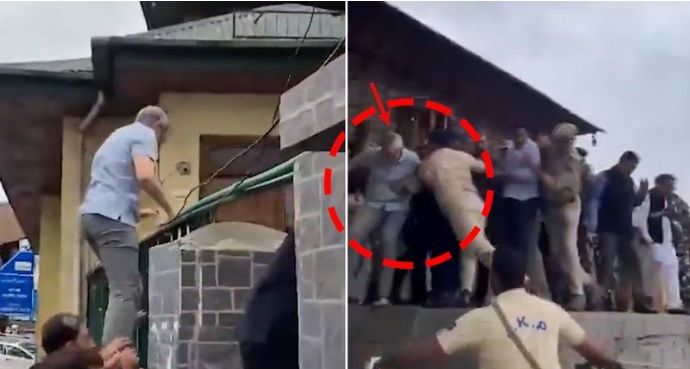Humiliation of Elected Govt: Omar Abdullah’s Martyrs’ Day Face-Off Sparks Political Uproar in Jammu & Kashmir
By: Javid Amin | Srinagar | 14 July 2025
Martyrs’ Day Turns into a Constitutional Flashpoint
What was meant to be a solemn tribute at the Martyrs’ Graveyard in Srinagar turned into a high-voltage political showdown as Jammu and Kashmir’s Chief Minister Omar Abdullah and his party leaders were reportedly confronted, blocked, and physically restrained by police forces on July 13.
The incident has set off a political and constitutional firestorm, with opposition parties across ideological lines labeling it a “humiliation of an elected government” and a direct assault on democratic institutions.
PDP’s Aditya Gupta: “Democracy Crushed Under Boots”
Aditya Gupta, youth president of the People’s Democratic Party (PDP), described the confrontation as not just a personal slight but a symbolic erosion of constitutional dignity:
“This wasn’t a push—it was a deliberate humiliation of an elected government. The self-respect of the CM, his cabinet, and the mandate of the people has been crushed under the boots of a police state, acting on orders from those who treat J&K like a colony, not a constitutional unit.”
Gupta’s statement echoes growing concerns that elected leaders in Jammu & Kashmir are operating under the thumb of unelected bureaucratic control, particularly after the abrogation of Article 370 and the shift to Union Territory governance.
BJP’s Altaf Thakur: “Politics of Graves to Stay Relevant”
In sharp contrast, the Bharatiya Janata Party (BJP) has accused Omar Abdullah and the National Conference (NC) of staging political drama for electoral gain.
Altaf Thakur, BJP’s spokesperson in Kashmir, slammed the visit as a “calculated provocation”:
“Omar Abdullah is shamelessly indulging in the politics of graves just to remain politically relevant. By glorifying the events of 1931, he is whitewashing a day soaked in the blood of innocent Kashmiri Pandits.”
Thakur’s remarks reflect the BJP’s long-held ideological position that July 13, 1931, was not a democratic uprising, but a communal riot—a narrative that contradicts the historical framing adopted by most mainstream and separatist Kashmiri parties.
Sajad Lone: “Scripted Drama—Step Down to Save the Institution”
In a strongly worded and personal attack, People’s Conference chief and Handwara MLA Sajad Lone dismissed the incident as choreographed political theater:
“For a moment I was impressed. But now that you have given a ball-by-ball commentary of your so-called struggle in reaching the Martyrs’ Graveyard—I will bet my life. It was all scripted.”
Lone went further, calling on Omar Abdullah to resign in order to preserve the dignity of the Chief Minister’s office:
“A security person trying to grapple with a Chief Minister is a humiliation for all of us. Don’t set a precedent others will be forced to follow. These choreographed events are too predictable. Stop insulting the intelligence of common Kashmiris.”
Lone’s critique taps into Kashmir’s political fatigue—where symbolic gestures are often seen as manipulative stunts, especially when trust in all political actors is low.
Hurriyat’s Mirwaiz Umar Farooq: “Now He Knows the Taste of Powerlessness”
Mirwaiz Umar Farooq, chairman of the Hurriyat Conference, responded with a pointed reflection on the irony of power and helplessness:
“Power teaches little. Powerlessness teaches more. Today the CM sahab tasted the bitter medicine of authoritarian high-handedness and subsequent helplessness that common Kashmiris face every day.”
Mirwaiz, often under house arrest himself, implied that Omar’s experience was a brief glimpse into the lived reality of many Kashmiris post-2019.
“Hoping this experience shifts his focus to what is the first priority of every person—upholding their dignity, and their fundamental rights, and work sincerely towards its restoration.”
Mamata Banerjee: “This Snatches Democratic Rights”
Joining the chorus from outside Jammu and Kashmir, West Bengal Chief Minister Mamata Banerjee condemned the act as an attack on civil liberties:
“What is wrong in visiting the graveyard of martyrs? This is not only unfortunate, it also snatches the democratic right of a citizen.”
Banerjee’s remarks add a national political dimension to what was otherwise seen as a regional conflict, potentially escalating this into a pan-India constitutional issue about center-state relations and federalism.
Why It Matters: Democratic Authority vs. Administrative Power
This confrontation between police forces and the elected head of government raises critical constitutional and ethical questions:
-
Is the Chief Minister no longer the top authority in J&K?
-
If an elected CM can be blocked from a symbolic event, what message does it send about federalism and representative power?
-
Are security agencies overstepping, or simply executing Delhi’s political strategy?
These questions are not rhetorical. They lie at the heart of a broader debate on the nature of Indian democracy in conflict zones, especially in regions governed directly by the Union government.
Context: A Pattern of Erosion Post-Article 370
Since the abrogation of Article 370 in August 2019, Kashmir’s democratic space has been steadily shrinking:
-
Martyrs’ Day removed as a public holiday
-
Elected politicians detained or placed under house arrest
-
Public gatherings banned or heavily policed
-
Elections delayed without clear timelines
This incident serves as the latest—and perhaps most symbolic—example of how Kashmir’s political leadership is being undermined, even when in elected office.
Final Thoughts: A Red Line Crossed?
The fallout from this incident may not only reshape public perception of Omar Abdullah, but also deepen Kashmir’s political alienation. When elected leaders are physically barred from commemorating shared historical grief, the very legitimacy of electoral politics comes into question.
As Aditya Gupta asked:
“If this isn’t your red line, Omar Sahib, what is?”
And perhaps more importantly, what does that red line mean anymore in a region where democracy appears more ornamental than operational?



